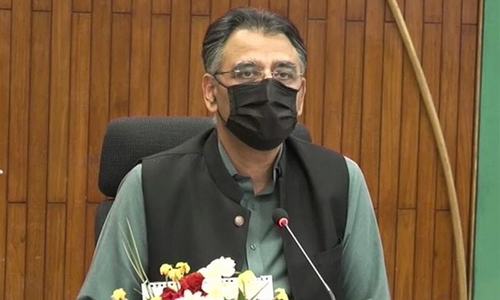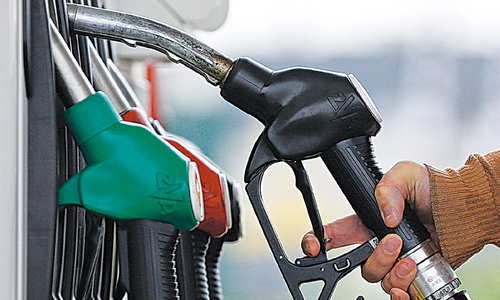ISLAMABAD: While increasing tax rates, the government on Wednesday reduced prices of all petroleum products by up to 2.5 per cent for the next 15 days to pass on partial impact of the decline in the international prices.
According to a notification issued by the finance ministry, the ex-depot price of petrol was reduced by Rs1.55 per litre and that of high speed diesel (HSD) by Rs3 per litre. It also reduced the ex-depot price of kerosene and LDO by Rs1.55 and Rs1.56 per litre, respectively.
As such, the ex-depot rate of high speed diesel (HSD) was fixed at Rs113.08 per litre instead of Rs116.08 per litre at present, showing a reduction of 2.58pc. Likewise, the ex-depot petrol price was set at Rs110.35 per litre against the existing rate of Rs111.90 per litre, down by 1pc.
Similarly, the ex-depot price of light diesel oil (LDO) was fixed at Rs79.86 per litre instead of the existing rate of Rs81.42, showing a reduction of 1.85pc. Also, the ex-depot price of kerosene was set at Rs82.06 per litre, instead of Rs83.61, down by 1.91pc.
A senior finance ministry official said the petroleum levy on all products was increased to improve revenue collection. He said that Ogra had recommended a reduction of Rs5.55 per litre in HSD price to pass on the impact of international prices to consumers, but the federal government decided to increase tax rate by Rs2.55 per litre and reduce its price by Rs3 per litre. Petrol price was reduced as recommended by the regulator.
Prices of petroleum products have been reduced for the first time in four months. The federal government kept the prices unchanged for three fortnights by reducing petroleum levy rates after increasing them for five consecutive fortnights.
The government kept unchanged the rate of petroleum levy for petrol at Rs11.23 per litre. However, it increased the PL on HSD to Rs15.29 per litre from existing rate of Rs12.74 per litre. The government also imposed levy on kerosene and LDO at the rate of Rs1.74 and Rs1.38 per litre, respectively. There was no levy on these two products before.
The government had already collected almost 30pc higher than targeted revenue on petroleum products through petroleum levy in the first six months of the current fiscal year. Therefore, it was comfortable with minor adjustments to the petroleum levy.
According to the ministry of finance, the collection on account of petroleum levy had amounted to Rs275bn in first six months against annual target of Rs450bn.
Over the last two years, the government has been tweaking with petroleum levy rates instead of the GST as levy remains in the federal kitty while the GST goes to the divisible pool taxes and thus about 57pc share was grabbed by provinces.
The petrol and HSD are two major products that generate most of revenue for the government because of their massive and yet growing consumption in the country.
Average petrol sales are touching 700,000 tonnes per month against the monthly consumption of around 600,000 tonnes of HSD. The sales of kerosene oil and LDO are generally less than 11,000 and 2000 tonnes per month.
Under the revised mechanism, oil prices are revised by the government on a fortnightly basis to pass on international prices published in Platt’s Oilgram instead of the previous mechanism of monthly calculations on the basis of import cost of Pakistan State Oil.
Published in Dawn, April 1st, 2021














































